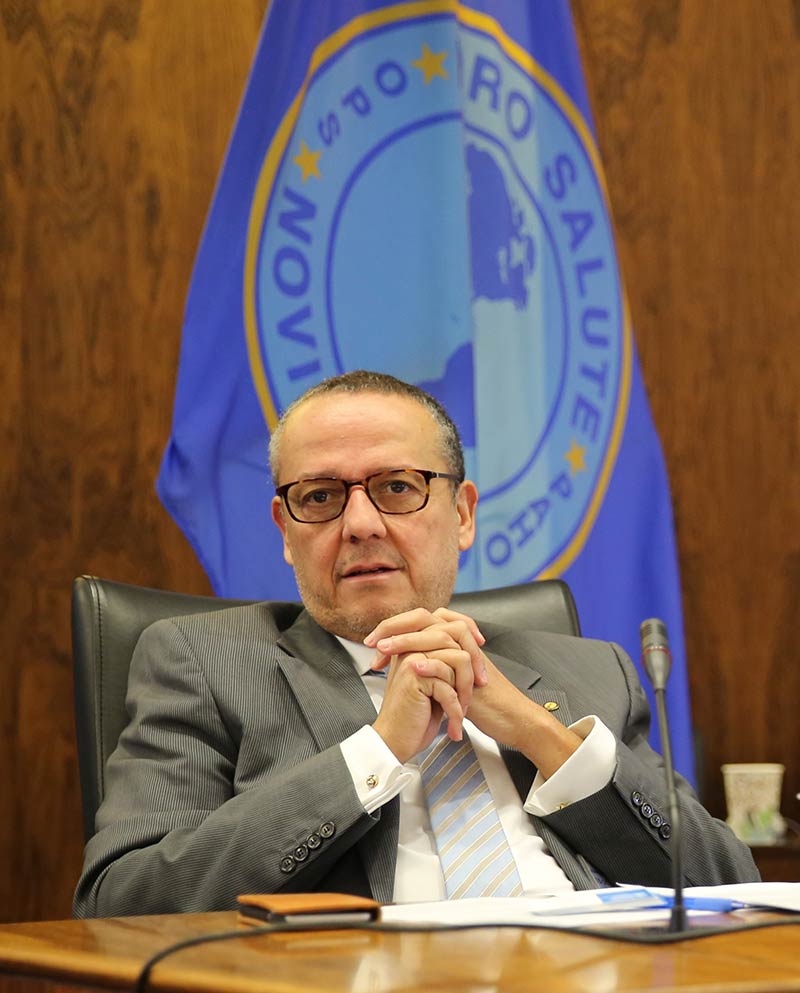Interview:
Marcela Cantero V.
Conexión Centroamericana
The director of PAHO's Department of Communicable Diseases and Health Analysis, Dr. Marcos Espinal, reviewed the necessary health measures for the isthmus in this interview with Conexión Centroamericana.
At 10 a.m. in Washington D.C., Dr. Marcos Espinal connected to the video call made by Conexión Centroamericana, from San José, Costa Rica.
After a month of negotiations for space in the busy agenda of the Director of the Department of Communicable Diseases and Health Analysis of the Pan American Health Organization (PAHO), the interview took place on July 31 with the assigned spokesperson for the countries of the region.
This is an excerpt from the half-hour conversation on the Covid-19 health crisis and the reality in Central America.
— At the time of this conversation, Central America has 129,000 cumulative cases with nearly 4,000 deaths from Covid-19, according to official data from its governments. What is PAHO's assessment of the region's response to this health crisis?
— Central America is a middle-income region, but there are still important lower-middle-income and low-income sectors that are most affected by this health crisis. In addition, there is an informal sector. Unemployment has increased and there are still basic needs, such as access to water, which need to be improved for certain sectors of the population. In short, we are struggling with a health crisis in the midst of socio-economic problems.
Moreover, it is not only this pandemic that is at stake. The health care system must also deal with non-communicable diseases, such as cardiovascular problems, diabetes, cancer, and must also deal with other infectious diseases, such as Zika. All of this requires a complex approach, but the countries of the region are assuming their responsibility and PAHO continues with its support work as an advisory and technical entity.
 Dr. Marcos Espinal is an expert in communicable diseases. Photo: Courtesy PAHO.
Dr. Marcos Espinal is an expert in communicable diseases. Photo: Courtesy PAHO.—It is true that PAHO's recommendations carry significant weight in technical matters, but that this is not the same in all countries?
— PAHO is a technical body of all member countries. We work with governments to provide health recommendations, which each country reviews and adopts. But they are nations that have their own reality, so they make the most appropriate decisions to address this crisis. Our delegates are there, in each of their nations, together with the governments to guarantee the necessary technical support.
“In the case of Nicaragua, we have insisted on different occasions on the urgent need to carry out tests to detect positive cases among the population, in addition to asking for details of the reports that are so necessary for us, like those of all the countries.”
(To date, the Nicaraguan government does not acknowledge that there is community transmission of the new coronavirus, a condition already established by PAHO, nor does it answer questions from the press about its confusing reports of the infected and the dead or complaints about the lack of measures to protect the population.).
— At the beginning, you said that this is not just a health crisis. Central American countries have already started reopening trade and, although future studies will confirm this, there has been a strong increase in cases. What is PAHO's position on economic recovery?
— PAHO has recommended that those in charge of finance, commerce, banking, in short, the entire economic sector, sit down at the table with the health experts from their countries so that there is a good channel of information in order to make the best decisions, a technical dialogue between both sides in order to properly manage the health crisis. Always, as PAHO, our message will be to give priority to the health of the population. We do not agree on reopening that overturn everything that has been achieved.
— From this technical perspective of PAHO, what should we improve to address the pandemic in Central America?
— Well, first the tests. Doing many tests in the population is important for health strategies and for making decisions for the epidemiological fences.
“Improve access to water. Without water, how can we ask for hygiene measures, such as hand washing? These are gaps that these countries still face. It is very important for governments to address these needs.”
Also, reaching the most vulnerable populations, the aboriginal areas of the countries of Central America, to attend to those who are more distant and therefore more susceptible to this pandemic.”
Above all, it is essential to support health workers, provide them with protective equipment and other measures. It is not just a matter of caring for doctors or nurses, but for everyone involved in responding to this emergency. PAHO has strongly advocated for this in order to take care of our health care workers.
— The eyes of the world are focused on the research to obtain a vaccine. Can Central America achieve immunization with PAHO as a key player?
— PAHO will play a key role when the SARS-CoV-2 vaccine becomes available. We are supporting the Covid-19 Global Access to Vaccines Fund (COVAX) which aims to ensure rapid, fair and equitable access to immunizations. Therefore, we are supporting the best design of this global access mechanism.
(COVAX was launched by the Bill & Melinda Gates Foundation's Global Alliance for Vaccines (GAVI) as a funding tool to provide access to immunizations for developing countries.)
Everyone, absolutely everyone, will have access to the vaccine under the PAHO model. In fact, America is one of the countries that has had the most access to immunizations. Of course, there is an issue of laboratory production capacity. But we can tell the region that it will have the vaccine when the time comes”.


Credits
This project is part of the Historias Sin Fronteras Cross-Border Science Journalism Initiative and has been made possible thanks to the support of the nonprofit journalism organization InquireFirst and the Department of Science Education of the Howard Hughes Medical Institute.